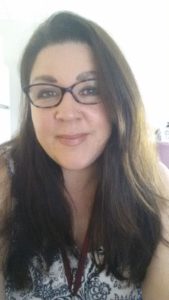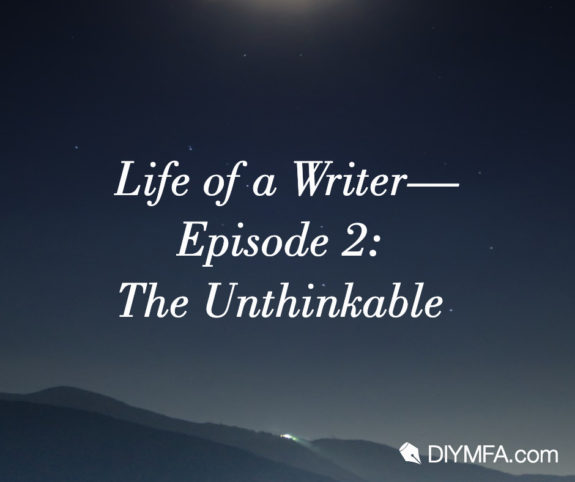In this column, Life of a Writer, every 8 weeks or so I will share the next episode in my journey as a middle-aged woman who finally gets serious about her dream of becoming a published author. This episode is about continuing on after the unthinkable happens.
In Episode 1 of this column, I wrote about the moment I recommitted myself to this dream, and how NaNoWriMo was the catalyst that made me believe it was possible. I then explained how a writing master class with Rachael Herron (her amazing “90 Days to Done” course) spurred me on to finally write that manuscript.
From the end of Episode 1: To my own pleasant surprise, I wrote for at least 60 minutes per day, six days a week. I averaged 90 minutes and 1,800 words per day. I wrote and wrote and wrote.
And then something unimaginably awful happened.
The Unthinkable
As I usually did every morning, I woke up at 4am on April 14, 2020 and wrote for 90 minutes. Two hours later, coffee in hand, I tried to motivate my younger sons for another day of remote learning when my phone rang.
It was E, my 25 year-old son’s fiancée. They lived in Houston, where they had moved in together ten months earlier. I thought it was odd for her to call me so early, but I answered, thinking maybe it was my son and his own phone was charging.
We are never prepared for those unthinkable moments, the ones that turn our world from color to black and white.
E told me that my son had passed away in bed less than an hour earlier.
Brain aneurysm. He had been diagnosed with several over the years, ticking time bombs we thought would stay buried like land mines from decades old wars.
Because of the pandemic, there was no traveling, no funeral, no proper goodbye. I spent the succeeding days and nights inside a web of cotton, a silken cocoon of grief. Everything criss-crossed inside me as I tried to make sense of the blurry outlines and colorless forms that moved around my upside-down existence.
I took a week off work, the only amount of paid leave I was permitted to take. And of course, I stopped writing. Rachael told me to take as much time as I needed, that I could go back to writing my book later, when I was ready.
But I knew there was no such thing as ready after something this unthinkable.
Coming Up for Air
The same day I went back to work, I decided to get back to writing and back to class. Was I ready? No, but I knew my son would’ve wanted me to continue. He was invested in my book almost as much as I was. We spoke several times a week, and he was with me on this journey to fulfill my childhood dream every step of the way.
I felt guilty sometimes, sharing my dream with him in detail and pursuing it with such passion. You see, he had to give up his childhood dream due to his illness, and he still hadn’t fully let it go.
From the time he was a boy, he wanted to be in the Army. His father and I were Air Force veterans and his older brother (my oldest son) was attending the Air Force Academy when Daniel and his twin brother were diagnosed with the rare genetic disease (so rare that they are still the only two known humans to have it) that ultimately took his life.
As a kid, Daniel loved war movies. He watched the entire series of Band of Brothers about a million times, and in his senior year of high school, he went to enlist in the Army. He wanted to become a medic, to help his wounded comrades. He didn’t know just how ironic that dream would become until he failed the Army physical.
The Army doctor heard something strange in his heart and told him to go get checked out, that it was “probably nothing,” and then he could come back and try again. Daniel wasn’t worried; after all, his twin brother passed his physical, had already taken the enlistment oath for the Marines, and had his date to ship out for Boot Camp.
Somehow, the doctor who approved Forrest (Daniel’s twin) to enlist in the Marines had missed it: an aortic aneurysm that had begun dissecting. They both had it. Thus began a years-long journey of aneurysm after aneurysm throughout their bodies. Forrest had to be medically discharged from the Marines even though he had never even gone to Boot Camp. Daniel had to give up his dream of being an Army medic. Now instead of helping wounded fellow soldiers, his own body was betraying and wounding him.
Attending his older brother’s graduation from the U.S. Air Force Academy in 2015 was bittersweet: he wanted to be happy for him—and he was—but there was a part that felt jealous for the stolen dream he still hadn’t made peace with yet.
Therefore, I tried not to talk too much about my book with Daniel, but he kept asking questions.
“How much did you write today?” he’d ask.
“What’s happening in the story now?” he’d inquire.
“Is she still dating the boy from Honduras?” he asked, as if wanting in on the gossip.
I told him all my plans for the story and the things I was still working out. He encouraged me and told me he was proud of me.
So, even though no one would’ve faulted me for it if I had, I decided the best way to honor him was not to quit, but to finish the darn thing.
My first day back at the keyboard was tough. After having written for so many days consistently without a break, coming back even after only a week off, I felt stilted in the process. Nothing flowed like it had before the unthinkable had happened.
However, when he passed away, I had already written 71,448 words. My goal was 80,000, but on the fourth day after I started writing again, I finished the first draft. It was 78,461 words, a little shorter than I had planned before the unthinkable happened.
Exactly 74 days after starting and only ten days after my son’s death, I reached the end of my story, so I typed every writer’s favorite word: END, and called it a day.
Emotionally drained, I printed my manuscript and held it in my hands. The weight of 374 pages felt heavier than I had imagined. I knew it wasn’t just paper and ink, but the bewildering contradiction of anguish and joy. Of smiles and tears. Of pride and guilt.
I didn’t yet realize that the hardest part of finishing this book was still to come.
You can read all about it in the next installment of this column. Stay tuned for Episode 3: A Finished Manuscript, Now What?

Anita Ramirez is a writer and teacher who transforms dispassionate teens into lovers of books — one reader at a time. When she’s not teaching Hispanic/Latinx literature and composition to her high school students or linguistics at the college level, she’s revising her first novel, a YA contemporary featuring bilingual characters. She loves the poetry of Pablo Neruda, teen movies from the 1980s and café con leche. You can check out her website, or follow her on Facebook, Twitter and Instagram.







